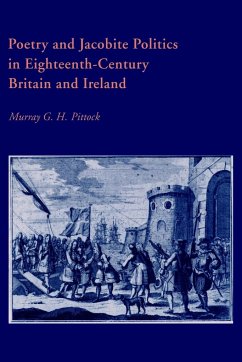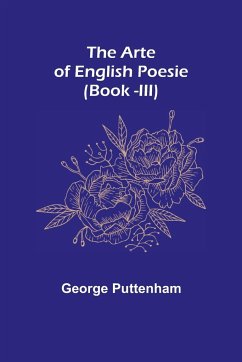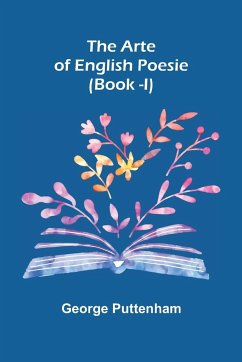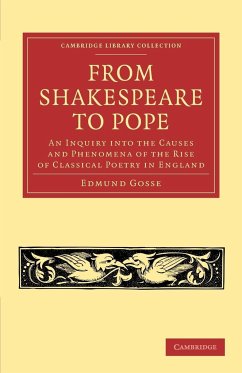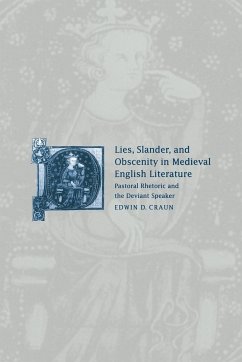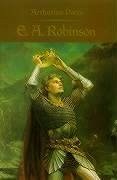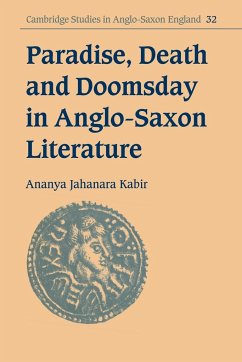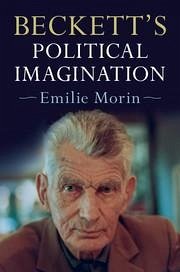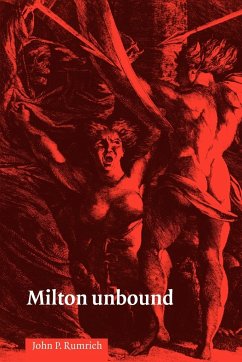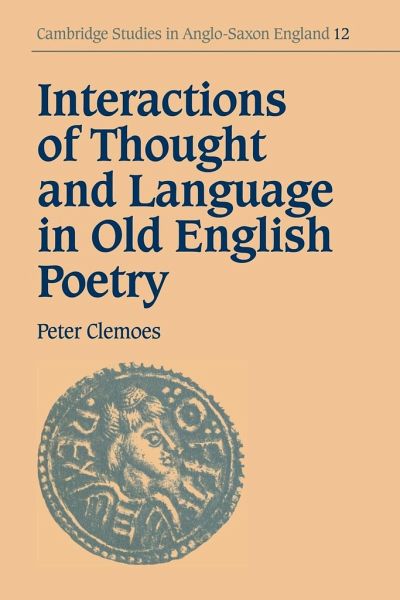
Interactions of Thought and Language in Old English Poetry

PAYBACK Punkte
26 °P sammeln!
Radical reinterpretation of Old English poetry and its relation to Anglo-Saxon thought and society.Peter Clemoes brings a lifetime's close study of Anglo-Saxon texts to this appreciation of Old English poetry, with an alternative interpretation which relates the poetry to both the entire Anglo-Saxon way of thinking and the structures of its society. Clemoes proposes a dynamic principle of Old English poetry, very different from the common notion of formulas slotted into poems for stylistic variation. In extended discussions of particular poems and images as well as of changes in language, he s...
Radical reinterpretation of Old English poetry and its relation to Anglo-Saxon thought and society.
Peter Clemoes brings a lifetime's close study of Anglo-Saxon texts to this appreciation of Old English poetry, with an alternative interpretation which relates the poetry to both the entire Anglo-Saxon way of thinking and the structures of its society. Clemoes proposes a dynamic principle of Old English poetry, very different from the common notion of formulas slotted into poems for stylistic variation. In extended discussions of particular poems and images as well as of changes in language, he shows how the poetic medium became a vehicle for increasing transformation to Christian literacy and to that religion's conceptions of the natural world, morality, and individuality. Carefully thought out and elegantly written, this book is also accessible to students: its numerous quotations are accompanied by modern English translations.
Review quote:
'The sheer volume of information about the Old English language and the poetry makes the book challenging and valuable.' Bryn Mawr Classical Review
Table of contents:
Illustrations; Preface; Abbreviations; Part I. The Poetry of an Aristocratic Warrior Society: 1. The chronological implications of the bond between kingship in Beowulf and kingship in practice; 2. Society's ancient conceptions of active being and narrative living; 3. Poetry's tradition of symbolic expression; 4. The language of symbolic expression; 5. Types of symbolic narrative; 6. Basic characteristics of symbolic story; Part II. The Poetry of a Universal Religion: 7. Vernacular poetic narrative in a Christian world; 8. Poet, public petitioner and preacher; 9. Symbolic language serving the company of Christ; 10. Adaptation to a new material morality; 11. From social hero to individual sub specie aeternitatis; 12. Loyalty as a responsibility of the individual; 13. This world as part of God's spiritual dominion; Works cited; Indexes.
Peter Clemoes brings a lifetime's close study of Anglo-Saxon texts to this appreciation of Old English poetry, with an alternative interpretation which relates the poetry to both the entire Anglo-Saxon way of thinking and the structures of its society. Clemoes proposes a dynamic principle of Old English poetry, very different from the common notion of formulas slotted into poems for stylistic variation. In extended discussions of particular poems and images as well as of changes in language, he shows how the poetic medium became a vehicle for increasing transformation to Christian literacy and to that religion's conceptions of the natural world, morality, and individuality. Carefully thought out and elegantly written, this book is also accessible to students: its numerous quotations are accompanied by modern English translations.
Review quote:
'The sheer volume of information about the Old English language and the poetry makes the book challenging and valuable.' Bryn Mawr Classical Review
Table of contents:
Illustrations; Preface; Abbreviations; Part I. The Poetry of an Aristocratic Warrior Society: 1. The chronological implications of the bond between kingship in Beowulf and kingship in practice; 2. Society's ancient conceptions of active being and narrative living; 3. Poetry's tradition of symbolic expression; 4. The language of symbolic expression; 5. Types of symbolic narrative; 6. Basic characteristics of symbolic story; Part II. The Poetry of a Universal Religion: 7. Vernacular poetic narrative in a Christian world; 8. Poet, public petitioner and preacher; 9. Symbolic language serving the company of Christ; 10. Adaptation to a new material morality; 11. From social hero to individual sub specie aeternitatis; 12. Loyalty as a responsibility of the individual; 13. This world as part of God's spiritual dominion; Works cited; Indexes.





